| Srl | Item |
| 1 |
ID:
123972
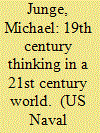

|
|
|
|
|
| Publication |
2012.
|
| Summary/Abstract |
Over the past decade the navy has changed dramatically. It has increased operations: decreased its number of ships; merged and created staffs and communities; responded to the 12 October 2000 bombing of the USS Cole-DDG-67 and 9/11; and deployed "Dirt Sailors" to fight inland battles in Iraq and Afghanistan. Meanwhile, the navy staff (OPNAV) has remained static, which one exception, the steady rise and fall of the Deputy Chief of Naval Operations Communication Networks Directorate or N6.
|
|
|
|
|
|
|
|
|
|
|
|
|
|
|
|
| 2 |
ID:
060828
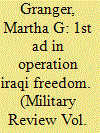

|
|
|
|
|
| Publication |
Nov-Dec 2004.
|
|
|
|
|
|
|
|
|
|
|
|
|
|
|
|
| 3 |
ID:
054901
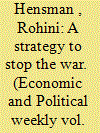

|
|
|
| 4 |
ID:
074802
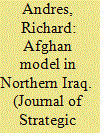

|
|
|
|
|
| Publication |
2006.
|
| Summary/Abstract |
In Operation 'Iraqi Freedom', as the Coalition's heavy forces fought in the South, in the North a handful of special operations forces, working with Kurdish rebels, clashed with the Iraqi army along the Green Line. In operations reminiscent of those used a year earlier to defeat the Taliban in Afghanistan, the lightly armed and heavily outnumbered Coalition forces called in air strikes to defeat Iraq's regular and Republican Guard army divisions. This article tells the story of these operations and discusses some of their implications for future US military policy. The success of the Afghan model in Iraq goes a long way toward demonstrating the efficacy of new air-heavy tactics and shows the strategic value of using light indigenous allies to replace heavy US land forces in both conventional combat and occupation operations.
|
|
|
|
|
|
|
|
|
|
|
|
|
|
|
|
| 5 |
ID:
080086
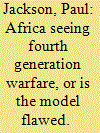

|
|
|
|
|
| Publication |
2007.
|
| Summary/Abstract |
Fourth Generation Warfare is a theory of contemporary warfare that posits a number of different ideas that are able to shed light on current conflicts. Whilst much of the debate has been concentrated on the linear development of warfare and also on analysis of the current situation of US forces in Iraq, it has resonance for a number of different conflicts taking place in Africa, if only because the US has become involved in contemporary conflicts in Somalia and the Mahgreb. There are clearly significant issues with the US-centric, flawed linear approach to history, but the actual analysis of modes of warfare has much to offer policymakers in a continent that is under-represented in the literature, and is also in danger of being forgotten in the shadow of analysis of Iraq. This paper moves on from criticising the stepped approach to history and looks at patterns of warfare in contemporary Africa, arguing that there is much in the theory that could be used to explain seemingly illogical tactics or patterns, and thus has much to tell policymakers engaged in conflict analysis
|
|
|
|
|
|
|
|
|
|
|
|
|
|
|
|
| 6 |
ID:
079798
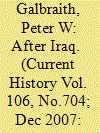

|
|
|
|
|
| Publication |
2007.
|
| Summary/Abstract |
In Iraq itself, the unintended consequences of the war have been worse even than Turkey's alienation and Iran's triumph
|
|
|
|
|
|
|
|
|
|
|
|
|
|
|
|
| 7 |
ID:
110305


|
|
|
|
|
| Publication |
2012.
|
| Summary/Abstract |
In the United States, the decision to go to war has often been propelled by a singular event, a 'trigger' that both galvanises and unites, at least temporarily, the US Congress, the nation's press and the American public. The attack on Pearl Harbor precipitated US entry into the Second World War, and the attack on the World Trade Center on 11 September 2001 led to American military involvement in Afghanistan. In both instances, thousands of innocent Americans had been killed on American soil by an easily identifiable, foreign enemy. The United States entry into the Korean War resulted from a somewhat different kind of trigger. While US forces were not directly attacked, there was, as President Lyndon Johnson's Deputy Undersecretary of State George Ball once wrote, 'a massive land invasion by 100,000 troops … a classical type of invasion across an established border'. Ball argued that North Korea's invasion of South Korea in June 1950 provided 'an unassailable legal and political basis for counteraction'.
|
|
|
|
|
|
|
|
|
|
|
|
|
|
|
|
| 8 |
ID:
052135
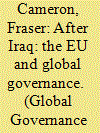

|
|
|
|
|
| Publication |
Apr-Jun 2004.
|
|
|
|
|
|
|
|
|
|
|
|
|
|
|
|
| 9 |
ID:
060290
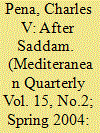

|
|
|
| 10 |
ID:
071100
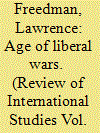

|
|
|
| 11 |
ID:
064596
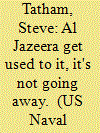

|
|
|
| 12 |
ID:
057795
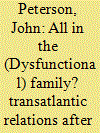

|
|
|
| 13 |
ID:
099899


|
|
|
|
|
| Publication |
2010.
|
| Summary/Abstract |
America won an asymmetric war in Iraq and lost an asymmetric peace. Translating material power advantage into favourable political outcomes has been a challenge for great powers down the ages-what makes this bridge even more difficult to cross today is the raised expectations on the part of liberal publics about the moral purpose of US-led interventions. In this sense, Iraq is part of the explanation for why influential liberals believe there is a 'crisis' in America's world leadership. 'America after Iraq' subjects this claim to analytical scrutiny-in particular it addresses whether Iraq was simply a chapter in a longer book detailing American power and purpose in the post-9/11 world? In answering this question the article is drawn to consider conceptual debates about a shift in the international system from anarchy to hierarchy with the US as the hegemonic power. While it rejects strong versions of the hierarchy thesis that imply the Washington is the new Rome, it is nevertheless drawn to an understanding of a hierarchical form of ordering where the US oscillates between a hegemonic role and an imperial outlaw. Seen through this lens, the Iraq War was an intervention that happened because it could, and not because it was just or necessary. Public opinion and the weakness of domestic institutions are also critical factors in explaining how it was possible for a previously status-quo oriented hegemonic power to act recklessly and put the rules and institutions of international society under strain.
|
|
|
|
|
|
|
|
|
|
|
|
|
|
|
|
| 14 |
ID:
077361
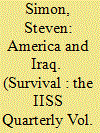

|
|
|
| 15 |
ID:
130871
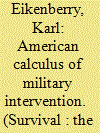

|
|
|
|
|
| Publication |
2014.
|
| Summary/Abstract |
The protracted campaigns in Afghanistan and Iraq have diminished America's appetite for waging wars to end tyranny or internal disorder in foreign lands. Military interventions have traditionally been a source of controversy in the United States. But America's appetite for the dispatch of armed forces has been diminished greatly by factors that have primarily emerged in the twenty-first century. These include, most painfully, the protracted campaigns in Afghanistan and Iraq that have made US political and military leaders more cautious about waging wars to end tyranny or internal disorder in foreign lands.
|
|
|
|
|
|
|
|
|
|
|
|
|
|
|
|
| 16 |
ID:
052998
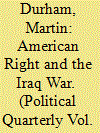

|
|
|
|
|
| Publication |
Jul-Sep 2004.
|
|
|
|
|
|
|
|
|
|
|
|
|
|
|
|
| 17 |
ID:
077115
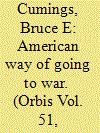

|
|
|
| 18 |
ID:
086662
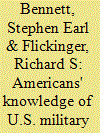

|
|
|
|
|
| Publication |
2009.
|
| Summary/Abstract |
Americans allegedly have an aversion to battle-related military casualties. Their estimates of military deaths may have influenced support for past U.S. military efforts. But what affects accurate estimates of military deaths in wartime? We review the accuracy of estimates for Iraq and three twentieth-century conflicts, finding that the public's estimates were more likely to be on target for Iraq. Then using five polls from the Pew Research Center for the People and the Press, we estimate logistic regression equations in which knowledge of military deaths is regressed on variables typically employed when scholars seek to understand the factors that affect what people know about public affairs. Gender and age always emerge as significant predictors. Education and attention to the news usually matter as well. We also show that estimates of military deaths in Iraq have palpable consequences for opinions about U.S. policies there.
|
|
|
|
|
|
|
|
|
|
|
|
|
|
|
|
| 19 |
ID:
072861
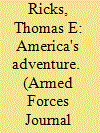

|
|
|
| 20 |
ID:
057948
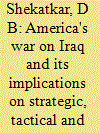

|
|
|